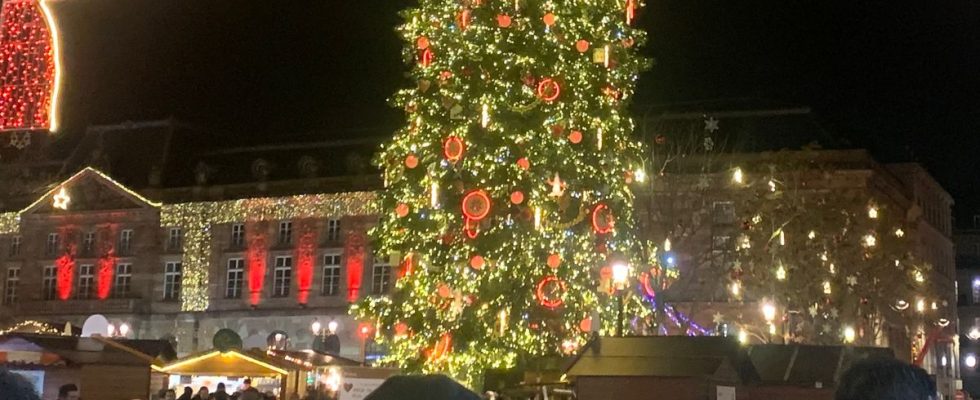Crowds trampling in the cold and the scent of mulled wine: the Christmas markets are full this year in Alsace, where the influx of tourists from far away is pushing towns and villages to the brink of saturation. Traffic jams, crowded public transport… From Strasbourg to Colmar via the typical villages of the Wine Route, millions of visitors roam the region in record numbers: that of 2.8 million, registered last year by the Alsatian capital, is about to be beaten.
A boon for business but not always for residents or tourists, who on weekends have to make their way at a snail’s pace between the 300 chalets spread across the Strasbourg city centre. “It’s oppressive, especially with three children,” recognizes Ambre Flanagan, a 38-year-old American tourist, who is nevertheless delighted with her stay in Strasbourg, where the Christmas market takes place like every year from November 24 to December 24.
Around the cathedral, the crowds are particularly dense on Saturdays, when the flow of consumers is added to that of tourists, to the point of making Josiane Chevalier, prefect of Bas-Rhin, fear “crowd movements”. “We are very clearly reaching certain limits,” she says.
“Monster success”
In a city marked by an attack in 2018, which left five dead, the omnipresent police forces have the mission to intervene in less than a minute in the event of an emergency. The prefect obtained that drones could monitor the demonstration. Faced with the influx, the authorities strictly enforce the ban on musicians or street portraitists, who create potentially dangerous gatherings.
The results of the season will not be known until January, “but we already know that we are in a historic year in terms of attendance”, observes Guillaume Libsig, deputy mayor in charge of the Christmas market.
A “monster success” because the Christmas markets are, according to him, “a perfect response to what we experienced in 2023: free, friendly, reassuring events which also bring back a little nostalgia and a little magic”. But faced with the saturation of transport and parking, “it should not increase even more”, he comments. “I think we are reaching the limits of the exercise. Public space is not expandable.”
Traders stick out their tongues
Neither does the patience of some residents. “It’s getting worse and worse,” complains Nicole Nussbaum, president of Calme Gutenberg, a neighborhood association. “Our entire daily life is disrupted: we have to do the shopping in the morning before the tourists. And the weekend is hellish: you have to swim back home. » On the trade side, turnover is expected to increase by 15% to 20% compared to last year in the two Alsatian departments, notes Nathalie Kaltenbach, president of Alsace destination tourism. But even the traders stick their tongues out.
“Honestly, at 9 p.m. I’m happy to close because we’re too tired, it’s too many people concentrated at once,” confides Sassi Ben Mourdi, who sells sausages and mulled wine at the market. Strasbourg, a family tradition since… 1946. “There are so many people that it’s not so pleasant anymore. People queue sometimes for an hour and a half to have a pancake or a mulled wine,” laments Barbara Jaeckel, a 27-year-old shopkeeper. On weekends, “we see people in the aisles who can no longer walk, everyone is arrested. It’s good for the economy, but I wouldn’t want to be in their place…”
“Saturation point”
For those who are frightened by the size of the markets in Strasbourg and Colmar, there remains the possibility of retreating to typical villages like Ribeauvillé or Riquewihr. But due to a lack of train access, these lovely towns are invaded by cars and visitors sometimes have to walk for kilometers before reaching their destination.
“We are perhaps reaching a saturation point,” recognizes Nathalie Kaltenbach, also mayor of the small town of Barr (Bas-Rhin), who confides that she was “scared” by the crowds at the market organized in her town. “We should not end up with a disappointment: tourists and residents must be happy” to come to the market.
At the foot of the giant fir tree in Strasbourg, some put things into perspective: “There are a lot of people for Europe, but I come from China so it’s okay,” says Li Lusha, a young Chinese woman who studies in Montpellier.

